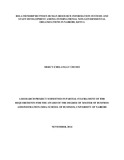| dc.description.abstract | International Non-Governmental Organizations are considerably increasing in number in
gathering, storing and analyzing information regarding their human resources through the use of
Human Resource Information Systems (HRIS) software or other types of software which include
HRIS functionality. The objective of the study was to establish the relationship between human
resource information systems and staff development among International Non-Governmental
Organizations in Nairobi. The study used a descriptive cross-sectional survey form of research
design. The population of the study consisted of 40 International Non-Governmental
Organizations operating in Nairobi under the health sector. A census survey was done targeting
all 40 International Non-Governmental Organizations. The researcher collected primary data by
use of a structured questionnaire which had both closed ended and open ended questions. The
questionnaire was administered through a drop and pick later method at an agreed time with the
researcher. The respondents were the Human Resource Manager in charge of the individual
International Non-Governmental Organization. The data was cleaned, coded and entries made
into the Statistical Package for Social Sciences (SPSS Version 20). The data was analyzed
through descriptive statistics such as measure of central tendency to generate relevant
percentages, frequency, mean. The study revealed that majority of the International NonGovernmental
Organizations have implemented HRIS in their human resource management
function with a main focus on staff development. It was also clear that most INGO’s focus on
staff development and take it as a priority to enhance its competitive advantage. It was
recommended that INGO’s in Kenya should enhance use of HRIS systems as it revealed a great
relationship with staff development. Limitation of the study was that it relied on one person the
human resource manager in each organization to respond to the questionnaire, so the results are
only indicative and not conclusive. It was suggested that further studies should be conducted to
investigate the factors affecting the implementation of the Human Resource Information Systems
on staff development in the International Non-Governmental Organizations (INGO’s). | en_US |

